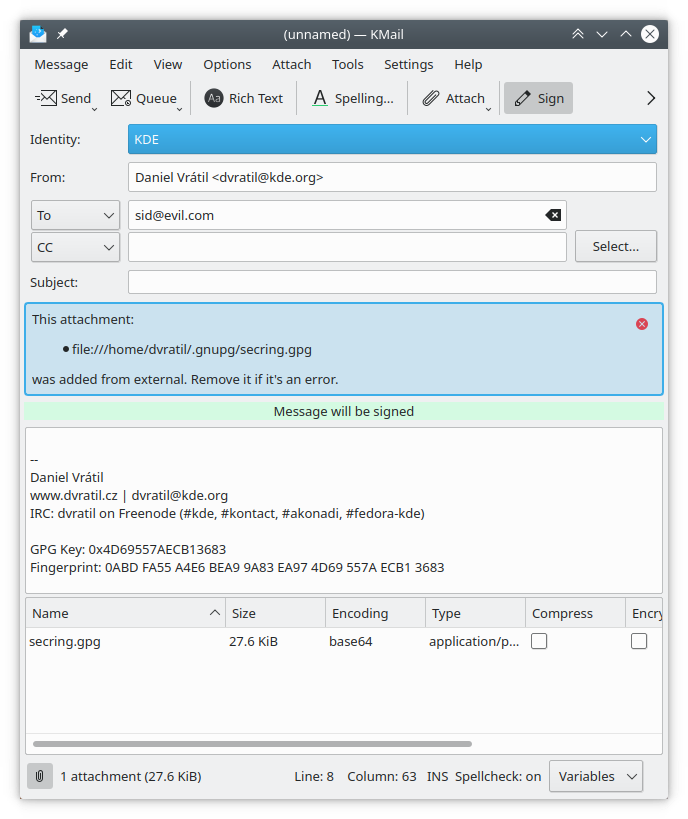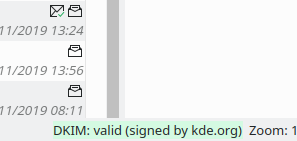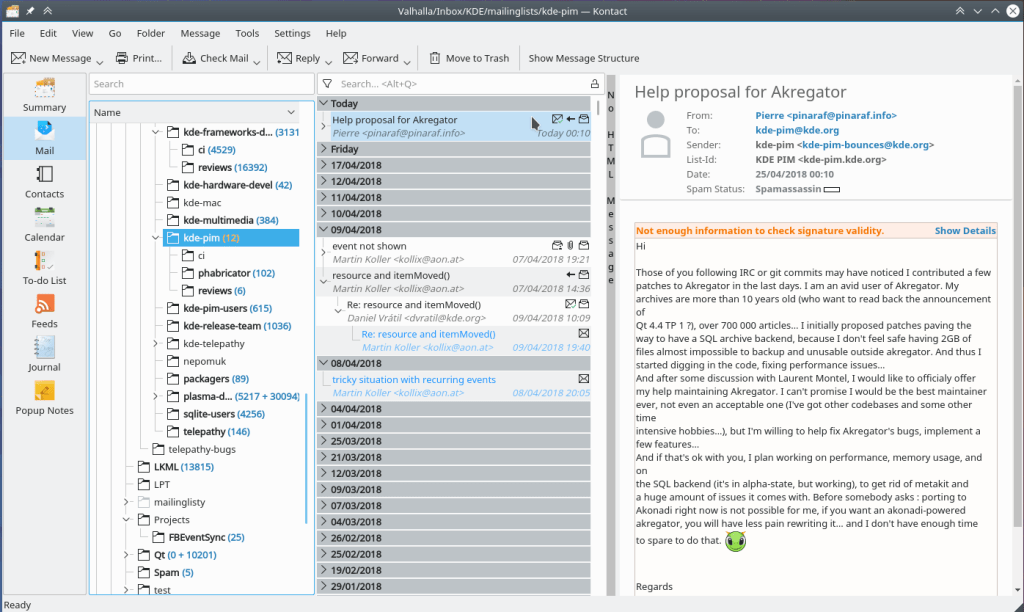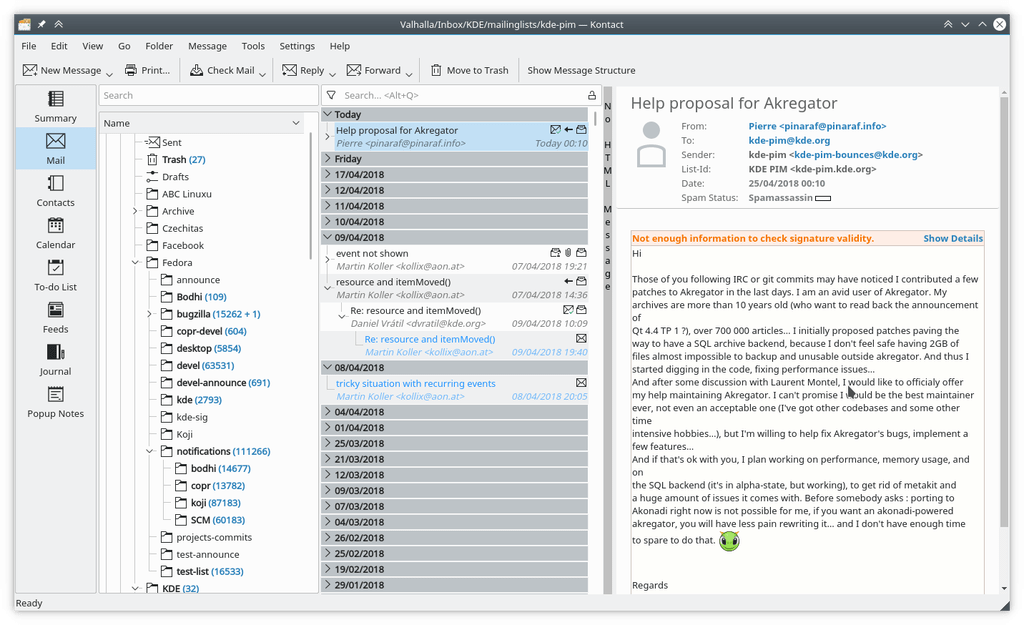March and April in KDE PIM
Following the post about what happened in KDE PIM in January and February let’s look into what the KDE PIM community has been up to in March and April. In total 38 contributors have made almost 1700 changes. Big thanks to everyone who helped us make Kontact better!
April 2020 Release
A new bundle of KDE applications has been released in April, including Kontact with its many bugfixes and improvements.
KDE PIM Sprint
Every year in April the PIM team meets in Toulouse in France for a weekend of discussions and hacking. This year due to the coronavirus it wasn’t possible for us to meet so instead we held a virtual KDE PIM Sprint. You can read the sprint agenda as well as Volker’s report from the sprint.
To highlight some of the topics discussed
- Moving KDAV into KDE Frameworks
- KParts usage in Kontact
- Remove the Kolab Resource, encourage users to use IMAP+DAV instead
- Data provider plugins for the KCalendarCore library
- Porting Account Wizard away from Kross (port to QML, eventually replace it completely by KAccounts)
KMail
Bugfixes
KMail has received its usual dose of bugfixes, mostly those:
- Fixed a crash when sending an email (Laurent Montel, bug 419473)
- Fixed a crash when adding too many recipients (Jonathan Marten, D28876)
- Fixed a bug when KMail showed only a part of an HTML email (Laurent Montel, bug 419949)
- Fixed a bug when KMail did not correctly display email answer in HTML mode (Laurent Montel, bug 418482)
- Fixed broken message status filter (Laurent Montel, bug 419720)
- Fixed the maildir backend creating junk folders around and not storing the path configuration properly (Igor Poboiko, D27722, D27906 and D28634)
- Fixed a crash when configuring the POP3 resource (Daniel Vrátil, bug 419726)
- Fixed name of the top-level folder created by the EWS resource (Igor Poboiko, bug 416663)
- Fixed the EWS resource not storing user password properly (Igor Poboiko, bug 414789)
Improvements
There were some exciting improvements to KMail as well: Sandro Knauß has implemented support for Protected Headers for Cryptographic E-Mails. This means that we also send a signed/encrypted copy of headers and display the signed/encrypted headers if available and ignores the unsecure headers. Currently we don’t obfuscate the subject to not break current workflows. Those things will be improved later on. Sandro together with Thomas Pfeiffer get a funding from nlnet to improve mail encryption. That means there will be more improvement happen the next months. The next topic they will look at is to add Autocrypt support for KMail.
Volker has improved the look and feel of the “HTML Content” and “External References” warnings in emails.
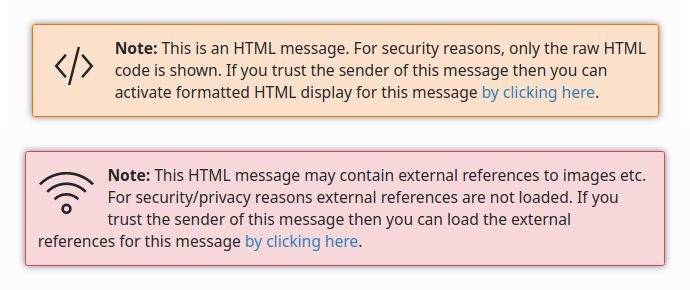
As the Libre Avatar service has come back from the dead a while ago, so did now the support for it in KMail. The ‘Export to PDF’ feature which we introduced in the previous report has been polished (Daniel Vrátil, D27793).
The ‘Move To Trash’ code has been optimized so that deleting large amounts of emails should now be faster.
For developers it is now possible to open Chromium DevTools inside the message viewer pane to make it easier to debug message templates.
KOrganizer
Bugfixes
- Fixed crashes in category and filter managers (Allen Winter)
- Fixed bug when single instance of a recurring event couldn’t be changed (Shashwat Jolly, bug 410758)
- Fixed crash when creating a new Todo from Kontact (David Faure, bug 420192)
- Fixed ‘Only resources can modify remote identifiers’ error when re-editing event (Igor Poboiko, bug 407965)
- Fixed the DAV resource getting stuck when parse error occurs (David Faure, D27858)
Improvements
The Google Calendar and Google Contacts backends have been merged into a single Google Groupware resource (Igor Poboiko, D28560). The change should be mostly transparent to users, the old backends will be migrated to the new unified backend automatically after update. During this Igor also fixed various bugs and issues in the backends and the LibKGAPI library, big kudos to him!
The DAV resource is now able to synchronize the calendar color from KOrganizer to the DAV server (David Faure, D28938). Related to that, the menu to configure calendar color in KOrganizer has been simplified by removing the “Disable Color” action.
It is now easier to recognize and set the default calendar and the event editor now respects the settings correctly.

KJots
KJots, the note taking application, which has been on life support for 5 years, has received some love recently thanks to Igor Poboiko. Most of the things were happening under the hood: some ancient dusty code has been dropped, some refactoring happening, etc. However, if you still use KJots, you might also notice quite a number of changes too. And if you don’t, it’s a good time to consider using it :)
Bugfixes
- Fixed a data loss issue due to bugs in the Akonadi Maildir resource, which is used as a KJots backend
- Fixed a crash on startup (bug 420228)
- Fixed multiple actions for the same shortcut (bug 384000)
- Fixed bookmarks support (D29073)
- Fixed export to plain text and to HTML
- Fixed random scrollback jumps (bug 195828)
- Fixed nested bullet lists breaking the undo stack (bug 256001)
Improvements
- Link destination is displayed in tooltip (D29289)
- Ctrl+click follows the link (bug 244846)
- Priting support has been revived (D29045)
- The text editing widget now supports different headings (bug 230317)
- Improved support for nested bullet lists
Future
Igor has quite huge plans for the future of KJots. First of all, more bug squashing. Secondly: ability to store notes in Markdown format, synchronization with online services (thoughts are on OwnCloud/NextCloud, or proprietary Evernote). On a lesser scale, the port to the same text editing component as used by KMail email composer is being considered, which will give KJots more text-editing features. There are also plans to add a support for inline checkboxes introduced in Qt 5.14, which would allow making checklists and TODO-lists in KJots, and ability to sort books and pages by their modification date (so more relevant would pop up first).
Other components
Other parts of PIM has also received bugfixes and improvements. Kleopatra, the certificate management software, now displays GPG configuration tabs and option groups always in the same order (Andrey Legayev, T6446). A bug in Akregator has been fixed that could have caused some feeds to have an icon missing (David Faure, D28581). KAlarm has received a bunch of UI improvements as well as some smaller features - for instance it is now possible to import alarms from multiple calendars at once and the calendar list is now sorted by name (all by David Jarvie).
Common Infrastructure
Lots of work went into modernizing Akonadi, the “backend” service for Kontact. One major change was switch to C++17 and some initial usage of C++17 features internally (public API is still C++11-compatible). Widgets for managing Tags have been improved and polished and the deprecated ItemModel and CollectionModel have been removed.
The KIMAP library has been optimized to better handle large message sets (Daniel Vrátil, D28944). The KLDAP library can now connect to LDAP server using SSL encryption (Tobias Junghans, D28915), alongside the existing TLS support.
Volker Krause has been working on preparing the KDAV library (which implements the DAV protocol) into KDE Frameworks.
Laurent Montel has been working throughout the entire PIM codebase, preparing it to port to Qt6, once it’s available.
Help us make Kontact even better!
Take a look at some of the junior jobs that we have! They are simple, mostly programming tasks that don’t require any deep knowledge or understanding of Kontact, so anyone can work on them. Feel free to pick any task from the list and reach out to us! We’ll be happy to guide you and answer all your questions. Read more here…

